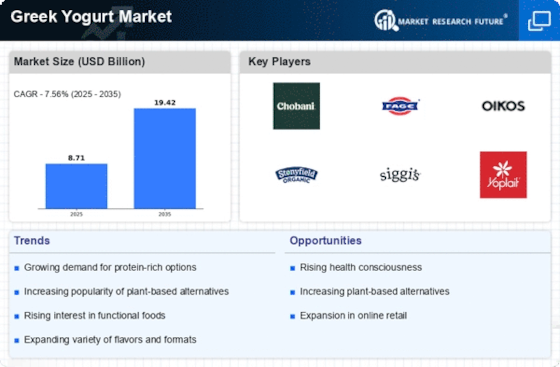Top Industry Leaders in the Greek Yoghurt Market

Strategies Adopted by Greek Yoghurt Key Players
The Greek yogurt market is marked by intense competition, characterized by a range of key players vying for market share and adopting diverse strategies to strengthen their positions. As of 2023, prominent companies dominate the landscape, leveraging strategic initiatives to navigate the challenges and capitalize on the opportunities within this dynamic sector.
Key players in the Greek yogurt market include
- Sun Valley Dairy (US)
- Erhmann AG (Germany)
- Jalna Dairy Foods Pty Ltd. (Australia)
- Byrne Hallow Farm (US)
- General Mills Inc (US)
- FAGE USA Dairy Industry Inc (US)
- Stonyfield Farm Inc (US)
- Nestle S.A. (Switzerland)
- Danone S.A. (France)
- Chobani LLC (US)
Strategies adopted by key players in the Greek yogurt market are multifaceted. Product innovation stands out as a primary approach, with companies consistently introducing new flavors, formulations, and packaging to cater to evolving consumer preferences. Additionally, strategic partnerships and collaborations, both with retailers and suppliers, enhance distribution networks and ensure a steady supply of raw materials. Furthermore, marketing efforts focused on highlighting the health benefits of Greek yogurt, such as high protein content and probiotic advantages, play a crucial role in driving consumer demand.
Market Share Analysis Factors:
Market share analysis in the Greek yogurt sector hinges on several factors. Quality remains a paramount consideration, with consumers associating loyalty to brands that consistently deliver a superior product. Pricing strategies also play a pivotal role, as companies strive to strike a balance between offering premium quality and competitive pricing. Effective marketing and branding efforts contribute significantly to market share, with consumer perceptions influenced by the portrayal of Greek yogurt as a healthier alternative in the dairy segment.
New & Emerging Companies:
In the realm of new and emerging companies, the Greek yogurt market has seen the entry of innovative players aiming to carve a niche for themselves. Brands like Noosa Yoghurt, The White Moustache, and Kite Hill have introduced unique propositions, such as exotic flavor combinations and plant-based alternatives, catering to specific consumer segments. These newcomers often focus on sustainability, organic ingredients, and transparency in their production processes, aligning with the evolving preferences of the modern consumer.
Industry Trends:
Recent industry news and current company investment trends in the Greek yogurt market underscore the dynamic nature of the sector. Companies are increasingly investing in sustainable and environmentally friendly practices, responding to the growing demand for ethically sourced and produced products. Additionally, there is a notable trend towards diversification, with key players expanding their product portfolios to include Greek yogurt-based snacks, beverages, and desserts. Such diversification aligns with consumer preferences for convenient and healthy options.
Competitive Scenario:
The overall competitive scenario in the Greek yogurt market is characterized by a balance between established players and the disruptive potential of emerging companies. Market leaders leverage their brand recognition, distribution networks, and economies of scale to maintain dominance. Simultaneously, emerging players capitalize on agility and innovation to challenge traditional norms and capture niche markets. The market's competitiveness is further intensified by the ongoing emphasis on digital marketing and e-commerce channels, as companies strive to enhance their online presence and engage with a broader consumer base.
Recent Development
In terms of recent developments in 2023, the Greek yogurt market has witnessed significant moves by key players. Notable partnerships between Greek yogurt brands and fitness influencers or nutritionists have become a common trend, leveraging the growing interest in health and wellness. These collaborations aim to position Greek yogurt as a versatile and nutritious food choice, not only for breakfast but also as a snack or ingredient in various recipes. Additionally, companies have made strategic investments in advanced manufacturing technologies to optimize production processes and improve overall efficiency.











